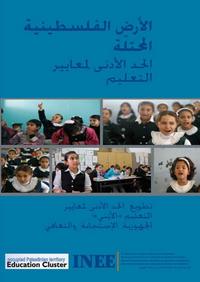Resources
Request support on coordination, information management, capacity development or other education in emergencies areas.
Demande de soutien en coordination, gestion de l’information, développement des capacités et autres domaines de l'éducation en situation d'urgence.
لطلب الدعم في مجال التنسيق ، إدارة المعلومات ، تنمية القدرات أو في اي مجال من مجالات التعليم في مناطق الطوارئ
Solicitar apoyo en coordinación, gestión de la información, desarrollo de capacidades u otra áreas en educación en emergencias.
Featured Resources
below you can find selected tools

COVID-19 Resources
View resources to support education in emergencies coordination during the COVID-19 pandemic.

Guidance on Education Cluster Co-Leadership Arrangements at the Country Level
Indicative Guidance for the establishment and management of co-leadership arrangements at the country level.

Inter-agency Network for Education in Emergencies
For technical education in emergencies resources, please visit the INEE website.
Summary Guide to Developing Education Cluster Strategies
This Summary Guide shows the six steps to developing an Education Cluster Strategy. It is a companion to the full Guide, providing an overview and identifying quick entry points for the guidance; for each step in the process you will find detailed, practical tips and guidance in the full Guide.…
- Coordination: Cluster Strategy
- HPC: Strategic Planning
Planning Meetings with Cluster Lead Agencies
This document contains guidance around topics that should be included in (initial) meetings with Cluster Lead Agency/Agencies (CLA) – considering Cluster experience of the UNICEF Representative and the Save the Children Country Director:
- Coordination: Coordination, Cluster Management, Leadership
- HPC: Strategic Planning
Operational Guidance Note: the use of schools, educational facilities and temporary learning centres as shelter
Ideally School buildings and education facilities should not be used as shelter by families who have been displaced due to conflict. Using school buildings as shelter denies displaced and host community children access to safe learning environments.However, in a case of mass displacement where no…
- Coordination: Coordination, Inter-Sector Coordination
- Emergency: Conflict, Displacement
- HPC: Implementation & Monitoring, Strategic Planning
- Technical Areas: Protection
Guide to Developing Education Cluster Strategies
The purpose of this Guide and accompanying Strategy Package is to provide practical, relevant guidance and resources to education in emergencies (EiE) coordination staff on how to develop and update an Education Cluster Strategy.
- Coordination: Cluster Strategy, Inter-Sector Coordination
- HPC: Strategic Planning
- Technical Areas: Accountability to Affected Populaiton, Localisation
Reference Module for the Implementation of the Humanitarian Programme Cycle
The IASC Reference Module for the Implementation of the Humanitarian Program Cycle defines the roles and responsibilities of international humanitarian actors and the way that they interact with each other, national and local authorities, civil society and with people affected by crises. This…
- Coordination: Coordination
- HPC: Implementation & Monitoring, Needs Assessment & Analysis, Operational Peer Review and Evaluation, Resource Mobilisation, Strategic Planning
- Technical Areas: Accountability to Affected Populaiton
Module de Référence pour la Coordination Sectorielle au niveau national
Ce Module de Référence décrit les principaux éléments de la coordination sectorielle et a été élaboré comme outil de référence pour les intervenants afin de soutenir leurs activités et d'améliorer l'efficacité de la réponse humanitaire.
- Coordination: Coordination, Cluster Management, Leadership
- HPC: Implementation & Monitoring, Needs Assessment & Analysis, Operational Peer Review and Evaluation, Resource Mobilisation, Strategic Planning
MODULE DE RÉFÉRENCE DE L’IASC POUR LA MISE EN ŒUVRE DU CYCLE DE PROGRAMME HUMANITAIRE
The IASC Reference Module for the Implementation of the Humanitarian Program Cycle defines the roles and responsibilities of international humanitarian actors and the way that they interact with each other, national and local authorities, civil society and with people affected by crises. This…
- Coordination: Coordination, Cluster Strategy, Needs Assessment, Information Management
- HPC: Implementation & Monitoring, Needs Assessment & Analysis, Operational Peer Review and Evaluation, Resource Mobilisation, Strategic Planning
- Technical Areas: Accountability to Affected Populaiton
Guidance on Cluster Leadership for Save the Children Country Offices: The Benefits, the Role and the Responsibilities
As a Cluster Lead Agency (CLA), Save the Children is inherently responsible for the effective establishment, management and sustained global and national support of the Education Cluster. The following document outlines the benefits to SC as well as the responsibilities of the Country Director (CD…
- Coordination: Coordination, Cluster Management, Leadership
- HPC: Implementation & Monitoring, Needs Assessment & Analysis, Operational Peer Review and Evaluation, Resource Mobilisation, Strategic Planning
- Technical Areas: Accountability to Affected Populaiton
Defining an Indicator
This document is intended to help you develop SMART indicators.
- Coordination: Needs Assessment, Information Management
- HPC: Implementation & Monitoring, Needs Assessment & Analysis, Strategic Planning
Contextualised INEE Minimum Standards for Occupied Palestinian Territories
Contextualised INEE Minimum Standards for Palestine in Arabic.
- Coordination: Coordination
- Emergency: Conflict
- HPC: Implementation & Monitoring, Needs Assessment & Analysis, Operational Peer Review and Evaluation, Resource Mobilisation, Strategic Planning
- Technical Areas: INEE Minimum Standards
Filter results
Coordination(selected )
Country(selected )
Emergency(selected )
Humanitarian Programme Cycle(selected )
Language(selected )
Publication Date(selected )
Publisher(selected )
Resource Type(selected )
Technical Areas(selected )
Can’t find what you’re looking for?
Contact your relevant language Help Desk










